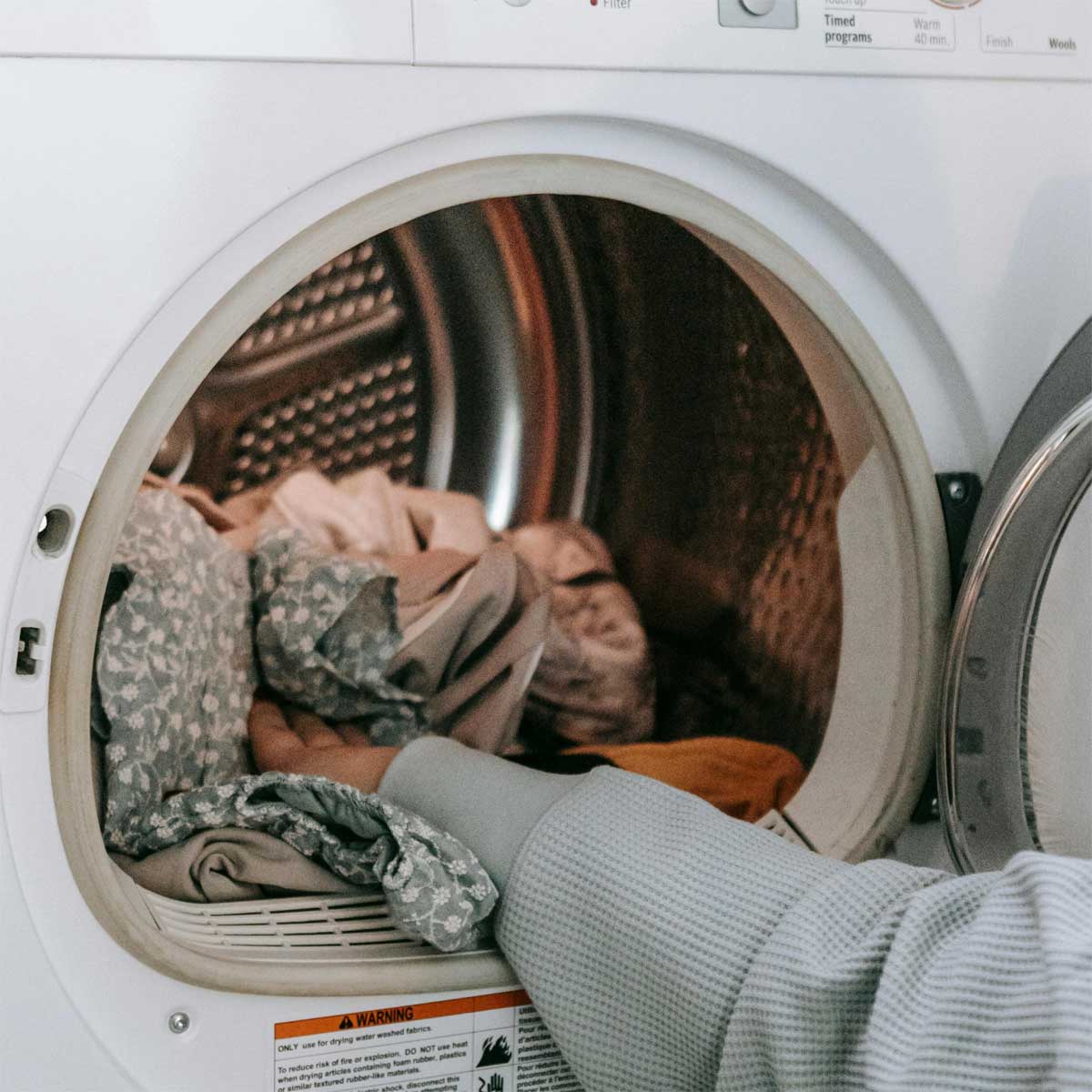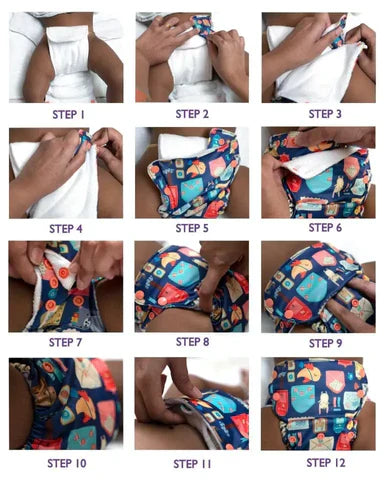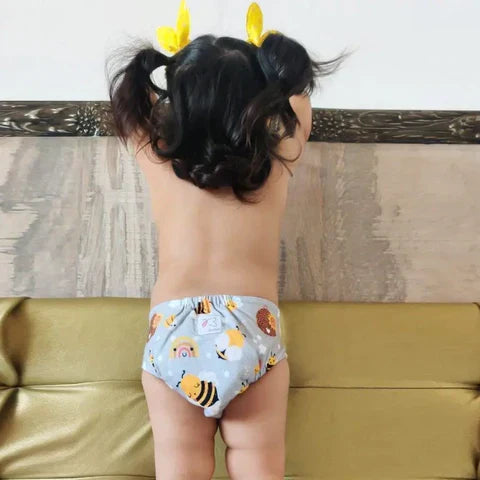When it comes to washing Cloth Diapers, you must pay attention to some details that should be followed strictly. There are some restrictions in washing Cloth Diapers but it is not a complicated process. Unlike some myths about Cloth Diaper wash routines, you can effectively get the most out of Cloth Diapers with some simple steps. You can wash the diaper by hand or in the machine. Follow these steps like a ritual for a long-lasting performance.
Here is What you will read in this blog!
- How to store soiled diapers?
- Hand Wash.
- Machine Wash.
- How to dry washed diapers?
- Do’s and Don’ts with Cloth Diaper.
- What Detergent to use?
- Quick Sum up.
How Do I Store the Dirty Cloth Diapers?
Before moving on to washing rituals, you must know how to store soiled diapers and accessories. This is a crucial step which decides how well a diaper will perform in the long run. You can remove soiled diapers and store it till the laundry day. Typically diapers should be washed every other day. It can be stored for a maximum of 3 days and not more than that. You must never rinse a soiled diaper and then store it till the washing day. Rinsing the soiled diapers will lead to pee build up and mineral build up. This will also damage the natural fibres like cotton and hemp.
If these natural fibres are wet for a longer period, it will start disintegrating. Hence leading to wear and tear of the accessories. This can get worse if you have hard water at your place. Remove the fully soaked cloth diaper off the baby’s bum. Do not rinse soiled diapers. Store it as such. Rinse only the pooped diapers. Use stay-dry liners for easy cleaning. Store the dirty diapers in a dry open pail out of reach of children.
3 Steps to Hand Wash the diapers and accessories?
There are 3 main steps you should follow when it comes to washing cloth diapers. Prewash, Main Wash and Final Rinse. You should follow these steps without making any mistakes to get rid of the pee completely from your diapers and accessories.
Prewash: This is the first and important step in washing the diapers. Prewash removes pee from the accessories. If you skip this step, you will not be able to wash off all the pee. Prewash preps the diapers for the main wash. So it is mandatory to do it. Soak all the laundry in ¼ of the recommended amount of detergent for 20-30 minutes. Rinse it well. This removes all the first hand dirt.
Main Wash: You may think, I have prewashed the cloth diapers in detergent. Rinse and agitation will be good follow up. So why do I have to soak and wash it all over again? Prewash removes the superficial dirt and not the ones in the deep layers inside. This is where Main Wash comes as a saviour. Soak the prewashed diapers in recommended amount of detergent for 30 minutes. Add Water Softener if you have Hard Water at your place. Spin and agitate the laundry well. A good agitation will help in removing the dirt in the deepest layers. Squeeze, agitate and rinse whenever necessary. Do not wring the diapers. Do not use brushes or soaps on the diapers and accessories. This will damage and lead to build up. You can rub it against each other or rub with hands.
Final Rinse: After the main wash, you should follow with a good rinse. Rinsing the laundry will help to remove the remnant detergent. Rinse all the washed laundry in clean and plain water twice. Rinse and agitate well until there are no soap suds or soapy feel. The Diapers should smell fresh post wash.
Machine Wash & 3 Steps to Follow:
It is the same as for Hand Wash however you need to take note of few things to avoid mistakes. There are 3 steps that you should follow for Machine wash as well. Prewash, Main wash, and Final Rinse. You can modify the Prewash step according to your preference.
Prewash – Run a Quick Wash Cycle for 20-30 minutes with detergent. This cycle should also contain rinse. Add water softener if you have hard water.
Main Wash – Add detergent & Water Softener for Hard Water. Choose a cycle that has spin and rinse. The Temperature should not exceed 40 degrees. This cycle should clean the soiled diapers as well. So a delicate cycle like baby clothes or gentle cycle won’t do the trick. The Main Wash should also be not less than 30 minutes and not more than 40 minutes. We recommend using Cotton 40 Cycle if available in your machine. Cotton 40 cycle is gentle on the diapers, does not exceed the washing temperature, suitable for heavily soiled diapers. Cotton 40 cycle also saves water and energy consumption than other cycles.
Final Rinse – This step plays a very important role in removing the soapy feel and determines the drying time as well. Do not add detergent in this step. If Main wash does not included rinse and spin, Run a separate rinse + spin cycle in plain water for 10-15 minutes and not more than that. Rinsing removes all the soap suds leaving the cloth diapers fresh. Spinning squeezes out the excess water so that diapers and accessories will dry faster.
Tips to Dry Cloth Diapers:
Once the cloth diapers are washed, they should be dried. You can either tumble dry or line dry the diapers. If you tumble dry the diapers, always remember to use the lowest heat settings. Excess heat will damage the waterproof lamination leading to leaks. Although we don’t recommend using dryers as it is not Eco-Friendly.
If you line dry the diapers and accessories, always sun dry them completely. Sun Drying will help remove the stains in diapers. It also helps to remove the bacteria. The Diapers and Accessories will look fresh and clean.
Always Sundry the waterproof covers inside out in case dry feel diapers. If it is Cover Diapers, quickly remove them from Sun Drying after 1-2 hours. Sun Drying the diapers will prevent mold growth and reduce the risk of losing your Cloth Diapers forever!
Do these things to your Cloth Diapers:
- Always store the soiled diapers in a dry open pail. Your baby’s diapers are not dripping wet. It is soaked and hence an open pail will dry it out a little.
- Wash the Diapers every alternate day. This will help in the long run to avoid worst-case scenarios like Build-ups.
- Squeeze out the extra water by hand well if you hand wash the cloth diapers. This helps with quick drying.
- Always close the hook with the laundry tabs provided (For Fluffie & Newborn Diapers). Do this for long-term durability and to avoid damage.
- Always use water softener while washing if you have Hard Water. Hard Water reduces the performance of the diapers. Your diapers will probably get mineral buildup. Water Softener will take care of the problem here.
- Read Here to learn how to tackle the Hard Water Problem for Cloth Diapers
Don’t do these to your Cloth Diaper:
- Do not rinse and store the diapers after removing them from the baby’s bum. Rinsing and storing will disintegrate the natural fibres leading to wear and tear. Rinse only the pooped diapers.
- Do not wash at high temperatures. The washing temperature should not exceed 40 degrees.
- Do not use baby detergent, soaps, fabric conditioners like comfort, or disinfectants. This will lead to build-ups and reduce the performance of the diapers. Your diapers will start to leak.
- Don’t use brushes to rub the diapers or accessories. This will damage the fabric.
- Do not wring the diapers. This will loosen the elastics and damage the buttons. Handle your diapers with gentle care.
- Don’t use gentle or baby cycle in washing machine. Although it is your baby’s diapers, it is peed and pooped in. You need a heavy cycle that will clean all the mess. Gentle wash cycle does not remove pee from the diapers.
- You should not iron your diapers or accessories.
What Detergent should I use for Cloth Diapers?
When it comes to washing Cloth Diapers, the first & foremost mistake that you do is ignoring and using whatever detergent you have. You must choose the right detergent for your diapers to work well. Choose a detergent that does not contain fragrance or additives. It should be a powder and commercial detergent if you hand wash. For machine, you can use liquid detergent without fragrance but not baby detergent. The Detergent should contain enough actives and surfactants to remove the dirt out. Optical brighteners should not be present. All these features work together to make the diapers clean and fresh. Otherwise, the detergent itself will cause the diapers to lose their ability to absorb. And you will end up with detergent buildup.
We recommend using Powder detergent for Hand wash and Matic Detergent (liquid) without fragrance for Machine wash. If you have a front loader, choose Front load Detergent. If you have a top loader, choose Top Load Detergent. Each machine performs differently, has different rpm, etc. Hence use the detergent that is meant for it. Always use the amount of detergent recommended by the Manufacturer. If you have Hard Water at your place, you should use Water Softener along with detergent. We recommend using Blue Oxy Water Softener. Use as recommended. Add extra detergent if you have hard water.
Here is a Quick Sum up!
Hand Wash:
- Prewash – Soak the laundry in detergent for 20-30 Minutes. Agitate and Rinse.
- Main Wash – Soak the prewashed diapers in recommended amount of detergent for at least 30 minutes. Agitate, squeeze, spin and repeat.
- Final Rinse – Rinse in plain water twice. Rinse well until all soap suds are gone.
Machine Wash:
- Prewash – Run a Quick wash cycle with detergent for not more than 30 minutes.
- Main Wash – Choose a Cycle that has Rinse and Spin. Add Detergent and Water Softener as recommended. The Cycle should not be less than 30 Minutes. Cotton 40 mode is preferred.
- Final Rinse – Rinse and Spin in Plain Water without Adding Detergent. See to it that it is included in Main Wash as a final step.
Detergent:
Choose the right detergent with no fragrance, additives or optical brighteners. Add Blueoxy Water Softener if you have hard water.
Posts you may like:
- A Beginner’s Guide to Cloth Diapers
- How to Size and Wear Cloth Diapers?
- Is Diaper free time necessary for babies?
- How to Wash Cloth Diapers in Hard Water?
- Hacks to Prevent Cloth Diaper Leaks?
- Debunk of Cloth Diaper Myths and Facts
- What is Detergent Buildup in Cloth Diapers?
- Are disposable diapers safe for babies?



Leave a comment
All comments are moderated before being published.
This site is protected by hCaptcha and the hCaptcha Privacy Policy and Terms of Service apply.